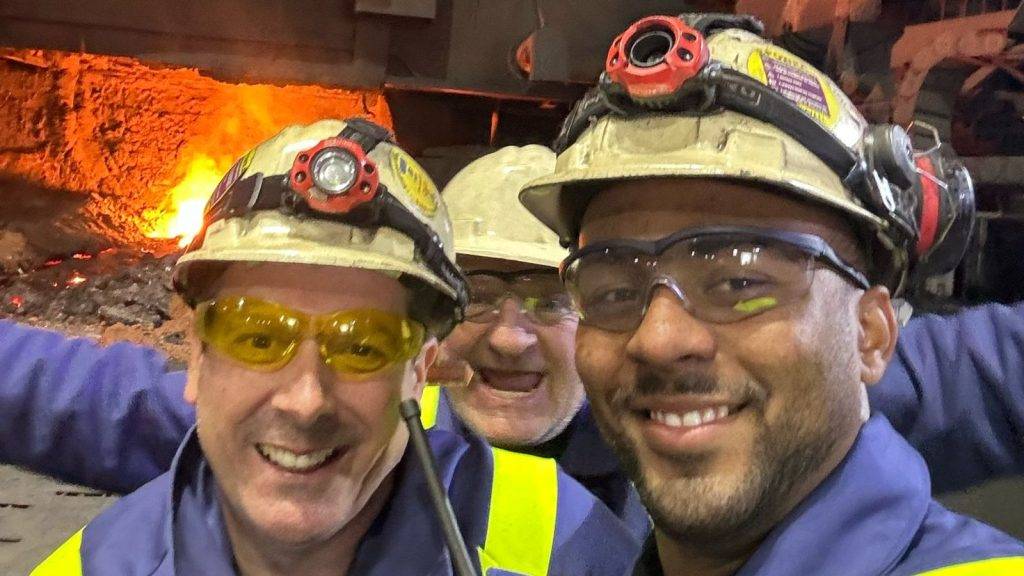Cliff Notes – How Port Talbot is grappling with the loss of more than 2,000 jobs
- Cassius Walker-Hunt, a former steelworker in Port Talbot, has transitioned to running a coffee shop after being made redundant due to Tata Steel’s closure of blast furnaces, marking a significant shift for the local workforce and community.
- Ongoing discussions surround the potential nationalisation of British Steel amid plans to close Scunthorpe’s blast furnaces, raising concerns for Port Talbot residents about their own job losses and lack of government support.
- The local council and Welsh government are actively seeking to provide support and transition funding for the affected workers, while the UK government promotes investment in greener technologies for the steel industry.
How Port Talbot is grappling with the loss of more than 2,000 jobs | UK News
One year ago, Cassius Walker-Hunt was working at Port Talbot’s steel plant.
Now, he’s running his own coffee shop in the town centre, having been made redundant when Tata Steel announced the closure of the plant’s blast furnaces.
The 28-year-old said the situation the town faced was “completely life-changing”.
“They called it an end of an era, and it was. That type of workforce in Wales now is gone, it wasn’t just a company shutting down, it was generations of knowledge and generations of workers,” he said.
Six months since Port Talbot’s last blast furnace was closed as part of Tata’s green transition, talks are ongoing to save thousands of jobs at British Steel amid plans to close Scunthorpe’s blast furnaces.
Mr Walker-Hunt was the fourth generation of his family to work in Port Talbot’s steel industry, a tradition now at an end.
“It’s something that I will never forget to be honest, being around the boys for the last time and all of us going off doing different things,” he said.
Mr Walker-Hunt said if the UK government did decide to nationalise British Steel, he would be “happy” for the people of Scunthorpe, but that it would come as a “low blow” to Port Talbot.
“Why couldn’t we have it? Why have you left us, our lot, fall apart? Why couldn’t we get that support?”
‘Groundhog Day’
Tata Steel announced last January that it was cutting 2,800 jobs, with most of those in Port Talbot.
Jack Harper had planned to spend his career working at the steelworks in the town.
He worked as an apprentice there from 2022 until September last year when he was let go.
The 29-year-old said watching the ongoing talks in Scunthorpe was “like Groundhog Day”.
“It’s been the exact same process, if not worse. Because the economic situation and the political situation is a lot worse with tariffs. We don’t know where we stand with it,” he said.
Mr Harper now works as a union support worker, helping former steelworkers as they look for alternative employment.
“It’s very gratifying because a lot of people I know have come through the door and have obviously got support through us. Ex-colleagues, friends, so it’s been really good helping people I actually know,” he said.
“The vast majority have been men, I’d say in their 30s to 50s, family men. They’ve got to put food on the table and when the one ticket in town, the major ticket in town, is gone, it’s a scramble now to find employment and get back on your feet.”
The steelworks in Scunthorpe are “a massive part of the UK industry”, according to Mr Harper.
“It’s not going to look good if we’re importing all of that from abroad, especially in the current economic situation,” he added.
‘Worth fighting for’
Plaid Cymru called for the nationalisation of Port Talbot steelworks last year when Tata announced its plans to replace its blast furnaces with an electric arc furnace, but those calls were “dismissed”.
The party’s business and trade spokesperson, Llinos Medi, said if the nationalisation of the steelworks at Scunthorpe goes ahead, people in Port Talbot would “rightly ask why their jobs and community were not worth fighting for”.
Liberal Democrat MP David Chadwick said constituents of his would be asking why the government “allowed” more than 2,000 jobs to be cut in Wales but were “seemingly less accepting of the destruction it would cause elsewhere”.
The Conservatives have pointed to their £500m rescue deal, which retained around 25% of the workforce at Port Talbot, and have called for a commercial solution in Scunthorpe.
Meanwhile, Reform UK has backed bringing British Steel under public ownership to secure the future of the industry.
A UK government spokesperson said Port Talbot “has always been and will always be a steelmaking town” but that the industry’s economic stability relied on “a cleaner, greener future”.
“Our Steel Strategy will set forth a positive vision for the future of the industry, backed up by up to £2.5bn of government investment, on top of the £500m being provided to transform Port Talbot,” they added.
The Welsh government said it has been “working closely with all parties to ensure that a range of support is available”.
“Much of the £80m transition funding from UK government is allocated to tailored support and we’d encourage anyone who has not already done so to see what support is available to them,” it added.
A Neath Port Talbot Council spokesperson said it was doing “all it can to support those affected by the closure of the blast furnaces at Port Talbot”.
“The council recently granted planning permission for Tata Steel’s £1.25bn electric arc furnace at Port Talbot which is expected to be up and running by early 2028,” they added.


